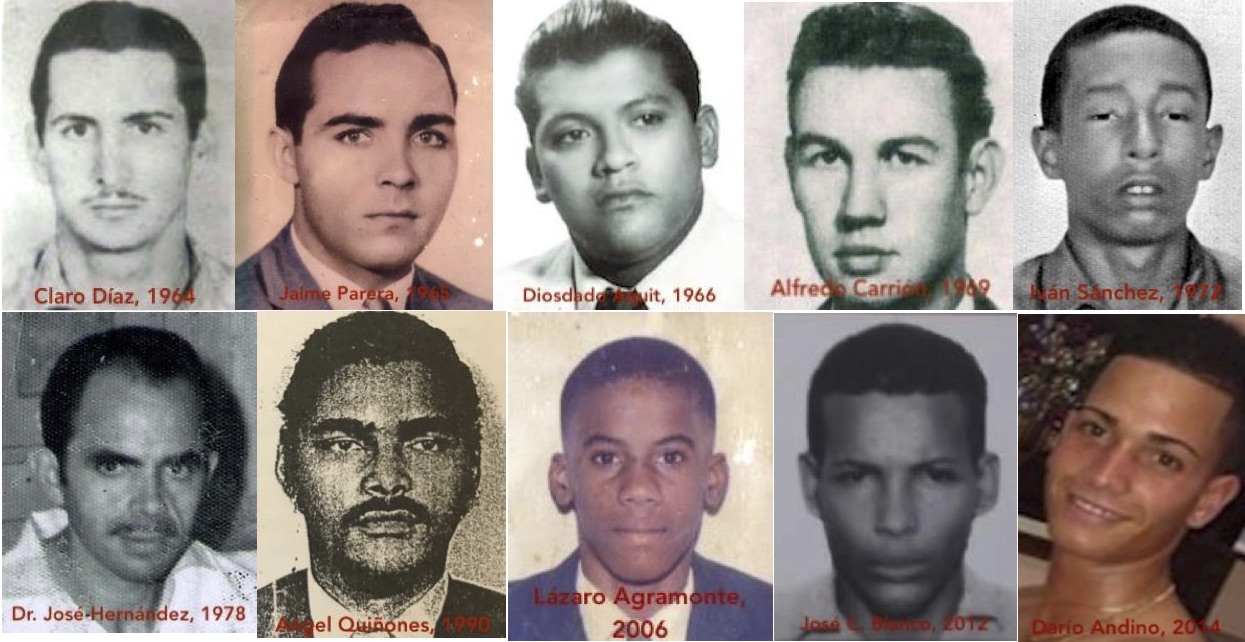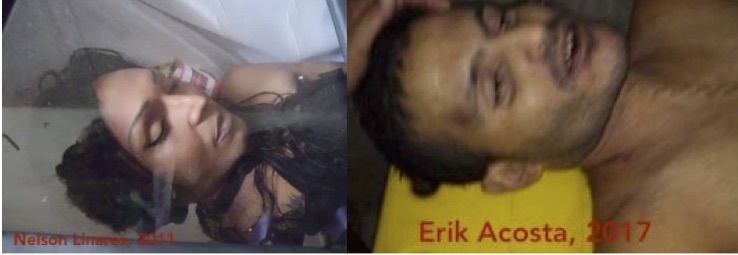
On August 9, 2018, 46 year-old
Alejandro Pupo Echemendía was murdered by prison guards at a police station in Placetas, Villa Clara province. He had been arrested two days earlier on charges of illicit horse racing. According to a fellow detainee, he was having a nervous breakdown when a police officer handcuffed him and several policemen proceeded to beat him with nightsticks and clubs and kicked him, throwing him to the ground
. Prison authorities fetched the lifeless body only after fellow detainees complained. Taken to a hospital, Pupo was pronounced dead. The family insisted on viewing the body and saw multiple signs of trauma. The funeral was held with heavy police presence and several human rights’ activists who tried to attend were turned away.
A fellow detainee who witnessed the killing, Abel Santiago Tamayo, and members of the victim’s family denounced the assassination through Jorge Luis García Pérez, known as Antúnez, a leading human rights’ activist from Placetas. Antúnez posted on social media the video of
Santiago’s testimony and those of the
wife, niece, nephew, and
sister of the victim as well as photos of the body showing an injury in one arm and large bruises on the back and all over the body (see some above).
The tip of the iceberg This case is remarkable in that it was promptly reported on filmed accounts of an eyewitness and family members of the victim that were quickly disseminated on social media. Also, these brave people are publicly denouncing the authorities’ efforts to silence them. Sadly, it is a telling glimpse of the
systematic slaughter occurring in Cuba’s dungeons for almost six decades.
Despite limited information and resources, Cuba Archive has documented deaths in prison or detention during the current Cuban regime that include the following
950 cases: 509 extrajudicial killings,
22 deaths in hunger strikes,
312 deaths from medical negligence/health reasons, and 107 suicides/alleged suicides (many might actually have been extrajudicial killings). The tally includes women and minors. Details and sources of the information on each of all these cases may be viewed at
database.CubaArchive.org, although these records are grossly insufficient in conveying the grave injustices and human suffering behind each of those stories. (Cuba Archive documents the deaths of all persons held for
any cause due to the absence of due process guarantees and the systematic violation of their rights, recognized in international instruments the Cuban state has ratified.)

The vast majority of deaths in the prisons are not reported but are estimated in the hundreds a year. Conditions are appalling and the treatment barbaric, monitoring and inspections by independent human rights’ organizations are not allowed, eyewitnesses and families of victims are silenced, and human rights’ defenders are persecuted. The number of prison facilities in Cuba is a secret and there are no well-informed estimates of the prison population, however, there are credible reports that the prison population is enormous and could be among the highest in the world per capita. An estimated five hundred facilities include well-known prisons as well as labor camps, correctional installations, and specialized facilities for minors, prostitutes, the military, persons with HIV/AIDS, etc. At least 120 prisoners are known to be held for outright political causes, but thousands are held nationwide for pre-criminal “social dangerousness” -the alleged
propensity to attempt against “socialist morals”- and for an assortment of “crimes” that are an aberration in civilized societies and are used to exert socio-political control, repress independent economic activity, and punish political opponents or dissenters.
Silencing the witnesses
Cuba’s State Security is embarked on a frantic campaign of threats and intimidation to cover up the murder of Alejandro Pupo. On August 21
st, Abel Santiago Tamayo, the eyewitness to Alejandro Pupo’s murder by Placetas police, was threatened by authorities and
forced to claim on video that he had been manipulated. But, he did not take back his account and later explained (also on
video) that State Security had taken him to a safe house to make him recant. On August 22
nd, Pupo’s niece and her husband were detained, threatened by State Security, and forced her to
accuse Antúnez on video of manipulating them for profit. Their 4-year old child was pushed and scratched during their arrest; the boy was left traumatized by the altercation. Since the assassination, several human rights’ defenders from Placetas, including Antúnez, Arianna López Roque, and Loreto Hernández García, are being harassed and threatened by authorities. Alexei Mora Montalvo was arrested on August 25
th and there is currently no information of his whereabouts. Other attempts to confuse public opinion, such as the fake mass emailing of videos of witness denials, are sloppy.
Children are also victi ms
ms That Cuban authorities abuse even children when arresting or threatening their parents is not new; there are many accounts of such incidents. The case of
Daniela Ramón Rodríguez, age 4, is particularly sad. She died March 26, 2013 at the Juan Manuel Márquez Hospital of Havana after a health crisis triggered by
police mistreatment. The little girl had a serious cardiac condition that had required open-heart surgery (congenital cardiopathy, enlarged heart, and aggressive pericarditis). She had been detained with her parents and denied food and medicine for hours before being handed to her grandfather. The police ignored her parents’ plights and threatened and offended them in front of their daughter, pressuring them to sign a confession of having committed a robbery with violence, which they refused. Two days after the traumatic event, Daniela’s health took a sudden downturn; she was placed in intensive care and died two months later. No evidence was presented backing the accusations and the parents insisted on their innocence, but the father was imprisoned and the mother released four days after the arrest only having posted a five hundred peso bail (more than the average monthly salary).
Countless children in Cuba are separated from parents imprisoned for years on all sorts of oppressive or trumped-up charges. Many have been attacked with their families -some even murdered- by Border Guards, police, State Security agents, or revolutionary mobs and others are held hostage as their parents are exploited as temporary workers overseas and may not see them for years if they leave their missions.
This is the Cuba hidden from the world that we must continue to report on.


 On August 9, 2018, 46 year-old Alejandro Pupo Echemendía was murdered by prison guards at a police station in Placetas, Villa Clara province. He had been arrested two days earlier on charges of illicit horse racing. According to a fellow detainee, he was having a nervous breakdown when a police officer handcuffed him and several policemen proceeded to beat him with nightsticks and clubs and kicked him, throwing him to the ground. Prison authorities fetched the lifeless body only after fellow detainees complained. Taken to a hospital, Pupo was pronounced dead. The family insisted on viewing the body and saw multiple signs of trauma. The funeral was held with heavy police presence and several human rights’ activists who tried to attend were turned away.
On August 9, 2018, 46 year-old Alejandro Pupo Echemendía was murdered by prison guards at a police station in Placetas, Villa Clara province. He had been arrested two days earlier on charges of illicit horse racing. According to a fellow detainee, he was having a nervous breakdown when a police officer handcuffed him and several policemen proceeded to beat him with nightsticks and clubs and kicked him, throwing him to the ground. Prison authorities fetched the lifeless body only after fellow detainees complained. Taken to a hospital, Pupo was pronounced dead. The family insisted on viewing the body and saw multiple signs of trauma. The funeral was held with heavy police presence and several human rights’ activists who tried to attend were turned away.
 Cuba’s State Security is embarked on a frantic campaign of threats and intimidation to cover up the murder of Alejandro Pupo. On August 21st, Abel Santiago Tamayo, the eyewitness to Alejandro Pupo’s murder by Placetas police, was threatened by authorities and
Cuba’s State Security is embarked on a frantic campaign of threats and intimidation to cover up the murder of Alejandro Pupo. On August 21st, Abel Santiago Tamayo, the eyewitness to Alejandro Pupo’s murder by Placetas police, was threatened by authorities and 

No comments:
Post a Comment